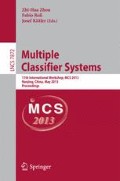Abstract
Clustering Ensemble effectively improves clustering accuracy, stability and robustness, which is most resulted from the diversity of the base clustering results. It is a key point to measure the diversity of clustering results. This paper proposes a method to measure diversity of base clustering results and a covariance-based selective clustering ensemble algorithm. Experiments on 20 UCI data sets show that this algorithm effectively improves the clustering performance.
Access this chapter
Tax calculation will be finalised at checkout
Purchases are for personal use only
Preview
Unable to display preview. Download preview PDF.
References
Han, J.W., Kamber, M.: Data Mining: Concepts and Techniques. Morgan Kaufmann (2007)
Tang, W., Zhou, Z.H.: Selective Clustering Ensemble Based on Bagging. Journal of Software 16(4), 496–502 (2005)
Strehl, A., Ghosh, J., Cardie, C.: Cluster Ensembles: A Knowledge Reuse Framework for Combining Multiple Partitions. Journal of Machine Learning Research (3), 583–617 (2002)
Topchy, A., Jain, A.K., Punch, W.: A Mixture Model for Clustering Ensembles. In: Proc. of the 4th SIAM International Conference on Data Mining, pp. 379–390 (2004)
Topchy, A., Jain, A.K., Punch, W.: Clustering Ensembles: Models of Consensus and Weak Partitions. IEEE Trans. on Pattern Analysis and Machine Intelligence 21(12), 1866–1881 (2005)
Luo, H.L., Jing, F.R., Xie, X.B.: Combining Multiple Clusterings Using Information Theory Based Genetic Slgorithm. In: IEEE International Conference on Computational Intelligence and Security, vol. 1, pp. 84–89 (2006)
Hassan, S.Z., Verma, B.: Decisions Fusion Strategy: Towards Hybrid Cluster Ensemble. In: Intelligent Sensors, Sensor Networks and Information, pp. 377–382 (2007)
Mohammadi, M., Nikanjam, A., Rahmani, A.: An Evolutionary Approach to Clustering Ensemble. In: The Fourth International Conference on Natural Computation, vol. 3, pp. 77–82 (2008)
Iqbal, A.M., Moh’d, A., Khan, Z.A.: Semi-supervised Clustering Ensemble by Voting. In: The International Conference on Information and Communication System, pp. 1–5 (2009)
Wang, H.J., Li, Z.S., Qi, J.H.: Semi-Supervised Cluster Ensemble Model Based on Bayesian Network. Journal of Software 21(11), 2814–2825 (2010)
Jia, J.H., Xiao, X., Liu, B.X.: Bagging-Based Spectral Clustering Ensemble Selection. Pattern Recognition Letters 32(10), 1456–1467 (2011)
Yang, Y., Wang, H., Lin, C., Zhang, J.: Semi-supervised Clustering Ensemble Based on Multi-ant Colonies Algorithm. In: Li, T., Nguyen, H.S., Wang, G., Grzymala-Busse, J., Janicki, R., Hassanien, A.E., Yu, H. (eds.) RSKT 2012. LNCS (LNAI), vol. 7414, pp. 302–309. Springer, Heidelberg (2012)
Iam-On, N., Boongoen, T., Garrett, S., Price, C.: A Link-Based Cluster Ensemble Approach for Categorical Data Clustering. IEEE Transactions on Knowledge and Data Engineering 24(3), 413–425 (2012)
Zhou, Z.H., Wu, J., Tang, W.: Ensembling Neural Networks: Many Could be Better Than All. Artificial Intelligence 137(1-2), 239–263 (2002)
Fern, X.Z., Lin, W.: Cluster ensemble selection. Statistical Analysis and Data Mining 1(3), 128–141 (2008)
Azimi, J., Fern, X.Z.: Adaptive cluster ensemble selection. In: Proceedings of the Twenty-First International Joint Conference on Artificial Intelligence (IJCAI 2009), pp. 992–997 (2009)
Jia, J.H., Xiao, X., Liu, B.X.: Similarity-based Spectral Clustering Ensemble Selection. In: Proceedings of the 9th International Conference on Fuzzy Systems and Knowledge Discovery (FSKD 2012), pp. 1071–1074 (2012)
Liu, L.M., Fan, X.P.: A New Selective Clustering Ensemble Algorithm. In: Proceedings of the 9th International Conference on e-Business Engineering (ICEBE), pp. 45–49 (2012)
Fern, X.Z., Brodley, C.E.: Random Projection for High Dimensional Data Clustering: A Cluster Ensemble Approach. In: Proceedings of the 20th International Conference on Machine Learning (ICML 2003), pp. 186–193 (2003)
Derek, G., Alexey, T., Nadia, B.: Ensemble Clustering in Medical Diagnostics. In: Proceedings of the 17th IEEE Symposium on Computer-Based Medical Systems, CBMS, pp. 576–581 (2004)
Hadjitodorov, S.T., Kuncheve, L.I., Todorova, L.P.: Moderate Diversity for Better Cluster Ensembles. Information Fusion 7(3), 264–275 (2006)
Luo, H.L., Kong, F.S., Li, Y.X.: Diversity Measure of Cluster Ensemble. Journal of Computers 30(8), 1315–1324 (2007)
Li, K., Gao, H.T.: A Novel Measure of Diversity for Support Vector Machine Ensemble. In: Proceedings of the Third International Symposium on Intelligent Information Technology and Security Informatics (IITSI), pp. 367–370 (2010)
Zhou, Z.H.: Ensemble Methods: Foundations and Algorithms, Boca Raton, FL (2012)
MacQueen, J.: Some Methods for Classification and Analysis of Multivariate Observations. In: Proceedings of the Fifth Berkeley Symposium on Mathematical Statistics and Probability, pp. 281–297 (1967)
Hartigan, J.A., Wong, M.A.: Algorithm AS 136: A K-Means Clustering Algorithm. Applied Statistics 28(1), 100–108 (1979)
Frey, J.B., Dueck, D.: Clustering by Passing Messages Between Data Points. Science 315(5814), 972–976 (2007)
Dunn, J.C.: A Graph Theoretic Analysis of Pattern Classification via Tamura’s Fuzzy Relation. Journal of Cybernetics 3(3), 32–57 (1973)
Bezdek, J.C.: A Convergence Theorem for the Fuzzy ISODATA Clustering Algorithms. IEEE Transactions on Pattern Analysis and Machine Intelligence 2(1), 1–8 (1980)
Yang, Y., Kamel, M.: An Aggregated Clustering Approach Using Multi-Ant Colonies Algorithms. Pattern Recognition 39(7), 1278–1289 (2006)
Author information
Authors and Affiliations
Editor information
Editors and Affiliations
Rights and permissions
Copyright information
© 2013 Springer-Verlag Berlin Heidelberg
About this paper
Cite this paper
Lu, X., Yang, Y., Wang, H. (2013). Selective Clustering Ensemble Based on Covariance. In: Zhou, ZH., Roli, F., Kittler, J. (eds) Multiple Classifier Systems. MCS 2013. Lecture Notes in Computer Science, vol 7872. Springer, Berlin, Heidelberg. https://doi.org/10.1007/978-3-642-38067-9_16
Download citation
DOI: https://doi.org/10.1007/978-3-642-38067-9_16
Publisher Name: Springer, Berlin, Heidelberg
Print ISBN: 978-3-642-38066-2
Online ISBN: 978-3-642-38067-9
eBook Packages: Computer ScienceComputer Science (R0)

